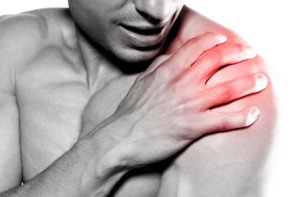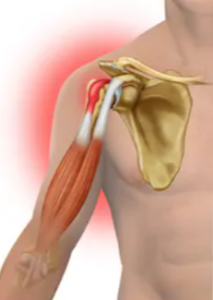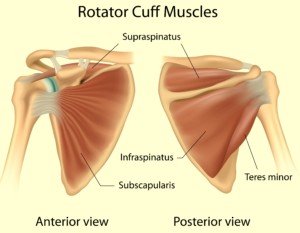
Symptoms of rotator cuff injury and biceps tendonitis overlap; a sports medicine doctor explains if there’s a way to tell difference.
Is there a way to tell the difference between the symptoms of a rotator cuff problem and that of biceps tendonitis?
“The reality of rotator cuff and biceps tendonitis injuries is that they go hand in hand,” says Dr. Mark Galland, orthopedic surgeon, sports medicine specialist and physician at Orthopaedic Specialists of North Carolina.
“It is rare to have them occur separately because the rotator cuff is comprised of four muscles, and the long biceps tendon attaches in the shoulder in between the first and second rotator cuff muscles,” continues Dr. Galland.
“One of the functions of the biceps tendon is identical to that of the rotator cuff, so when the rotator cuff is not healthy, the biceps tendon, under extra pressure, follows suit and can easily become unhealthy as well.”

Biceps tendonitis. Shutterstock/ilusmedical
Certain weightlifting exercises are more likely than others to injure the rotator cuff, namely chest and shoulder work.
The biceps tendon can also be injured with these exercises, and that includes the bench press.

Shutterstock/Alila Medical Media
You may be wondering how the biceps can be injured doing chest work when the biceps isn’t even involved in pressing motions.
But actually, the short head of the biceps does indeed play a minor role in pressing motions because chest pressing involves shoulder flexion. The biceps attaches to the shoulder joint.
“It is difficult to distinguish whether you have a rotator cuff or biceps tendon injury, since many of the symptoms overlap,” continues Dr. Galland.
“The truth is that there is so much connection between the two, to try to distinguish them is really an exercise in futility.
“If you have biceps tendonitis, you likely also have rotator cuff dysfunction.
“Again, while it is difficult to tell for sure because of the similarity in the symptoms, you can do this exercise to test for biceps tendonitis:
“First, bring your arm straight ahead and then try to raise it while pushing down on the arm with your other arm.
“If pain is present, you likely have biceps tendonitis.” That pain will be in the shoulder.
“Biceps tendonitis and rotator cuff injuries can both be treated with injections and subsequent physical rehabilitation.
“This is not something to ignore – if you have pain that you believe to be your rotator cuff and/or your biceps tendon, see your orthopedic specialist immediately.”
Dr. Galland has authored many book chapters and papers in sports medicine. His advice and consultation have been sought by world-class athletes in track and field and Major League Baseball.
 Lorra Garrick is a former personal trainer certified through the American Council on Exercise. At Bally Total Fitness she trained women and men of all ages for fat loss, muscle building, fitness and improved health.
Lorra Garrick is a former personal trainer certified through the American Council on Exercise. At Bally Total Fitness she trained women and men of all ages for fat loss, muscle building, fitness and improved health.
.










































